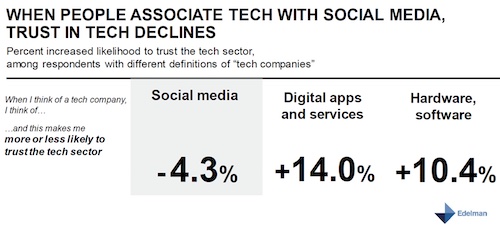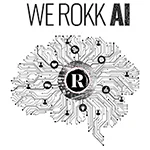 |
While the general level of trust in the tech sector globally remains high, there are signs of it slipping, and at least one potential crack could put a major dent in its reputational armor—social media.
The latest Edelman Trust Barometer special report, “Trust and Technology,” found that of the 12 sectors examined, technology came out on top, deemed trustworthy by more than three-quarters (76 percent) of respondents.
However, most other sectors did rather well too. Food & beverage (74 percent), healthcare (73 percent) and manufacturing (73 percent) were all very close behind. In fact, out of the categories examined in the study, only one did not have the approval of more than 60 percent of respondents. That one is social media, which recorded a trust rating of just 47 percent.
Social media’s low rating could turn out to be a big factor in the decline of the tech sector’s reputation as a whole. More than nine in 10 respondents (91 percent) said that they now think of social media and/or digital applications as being part of the tech sector. Although including digital apps and services as part of “tech” results in a 14 percent jump trust in the sector, adding social media accounts for a 4.3 percent drop.
 |
When looked at on a country-by-country basis, the US has a bigger challenge than many when it comes to trust in tech. Over the past 10 years, the study says that the US trust level has dropped 24 points to 54 percent. And while such countries as Canada, the UK and Japan are experiencing similar difficulties, trust levels in countries including Indonesia (91 percent), China (90 percent) and India (89 percent) are on an upward swing.
The study also finds a link between trust levels in tech and the likelihood of consumers opting to be “first adopters” of new technologies. In India (42 percent) and China (38 percent), for example, consumers appear much more likely to prioritize being first in line for new technologies than do those in the US (15 percent), UK (11 percent) or Japan (five percent).
As regards reasons for the slide in trust, the usual suspects come in for their share of the blame. Almost three-quarters of respondents overall (73 percent) say that they worry about their data privacy, with 71 percent adding that cybersecurity is also a concern. False information, fake news and “deepfakes” are also cited as big problems.
In addition, respondents were hesitant to rely on governments or tech platforms to serve as watchdogs for the sector. A majority (56 percent) indicated that they think government regulators do not have an adequate understanding of emerging technologies to effectively regulate them.
Nonetheless, respondents did see a positive side to the tech industry’s innovations, indicating that they think technological innovations can solve urgent societal challenges such as access to healthcare, economic competitiveness, availability of good-paying jobs, and information quality.


 Laura Anderson, who rose to VP/GM of global communications and events in a nearly 20 year stint at Intel, will take on the Americas technology chair at Burson following the completion of the BCW and H+K merger on July 1.
Laura Anderson, who rose to VP/GM of global communications and events in a nearly 20 year stint at Intel, will take on the Americas technology chair at Burson following the completion of the BCW and H+K merger on July 1. WE Communications has partnered with ROKK Solutions to form the WE ROKK AI service.
WE Communications has partnered with ROKK Solutions to form the WE ROKK AI service. In the dynamic world of modern business, effective communication is a pivotal tool for success across various industries. At Communications Strategy Group (CSG®), our expertise in embracing innovation in communication extends beyond traditional marketing strategies, paving the way for transformative industry-specific solutions.
In the dynamic world of modern business, effective communication is a pivotal tool for success across various industries. At Communications Strategy Group (CSG®), our expertise in embracing innovation in communication extends beyond traditional marketing strategies, paving the way for transformative industry-specific solutions. There are two types of tech PR professionals. Which one are you? And are C-suite executives making that decision for you?
There are two types of tech PR professionals. Which one are you? And are C-suite executives making that decision for you? While there’s an impulse to grab reporters’ attention with the newest industry-transforming tech product or service, a back-to-basics approach focused on telling the right stories to the right people is a far more successful way to ensure your technology campaign breaks through the clutter of today’s crowded tech landscape.
While there’s an impulse to grab reporters’ attention with the newest industry-transforming tech product or service, a back-to-basics approach focused on telling the right stories to the right people is a far more successful way to ensure your technology campaign breaks through the clutter of today’s crowded tech landscape.


 Have a comment? Send it to
Have a comment? Send it to 
Oct. 25, 2022, by Joe Honick
Edelman is a class outfit in the finest sense, even though I question some of the people they do business with. This study and its associated presentations are products of extremely well thought-out methodology and narrative. Frankly, it so overshadows all the many other polls and surveys reported in these pages almost daily open to question about reliability.
I printed up their whole package and have listened to at least a portion of their televised program....realizing quickly why they are who they are.
Thanks for publishing.